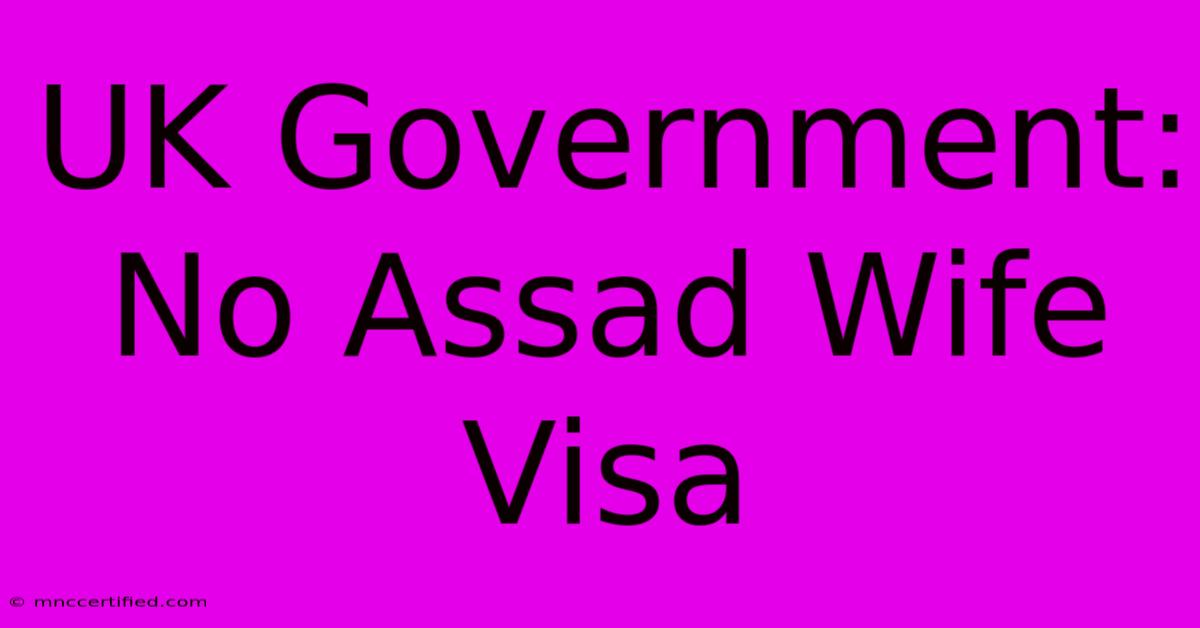UK Government: No Assad Wife Visa

Table of Contents
UK Government: No Assad Wife Visa – A Deep Dive into the Case
The UK government's refusal to grant a visa to Asma al-Assad, the wife of Syrian President Bashar al-Assad, has sparked considerable debate and highlights the complex interplay between humanitarian concerns, political realities, and international law. This article will delve into the key aspects of this case, examining the government's reasoning, the public reaction, and the broader implications of such decisions.
Understanding the UK's Visa Refusal
The UK government's decision to deny Asma al-Assad a visa is not publicly documented with specific details due to privacy and national security concerns. However, several factors likely contributed to this refusal:
Allegations of Human Rights Abuses: The Assad regime has been accused of widespread human rights abuses throughout the Syrian Civil War, including the use of chemical weapons, indiscriminate bombing of civilian areas, and the systematic torture of political opponents. Asma al-Assad's association with this regime, and the potential for her to benefit from it, is a significant factor in the visa denial. The UK government's strong stance against such atrocities likely played a crucial role.
Sanctions and International Pressure: The UK, along with many other countries, has imposed sanctions on members of the Assad regime, freezing their assets and restricting their travel. Granting Asma al-Assad a visa would contradict these sanctions and potentially undermine international efforts to hold the regime accountable for its actions. This aligns with the UK's commitment to upholding international law and supporting accountability for human rights violations.
National Security Concerns: The UK government has a responsibility to protect its national security. Granting a visa to an individual closely associated with a regime accused of terrorism and state-sponsored violence could pose a security risk. This concern, while not explicitly stated, is likely a significant factor behind the decision.
Public Reaction and Media Coverage
The government's decision has been met with mixed reactions. Some have praised the UK for taking a principled stand against human rights abuses, while others have criticized the decision as being overly political and potentially counterproductive to diplomatic efforts. The media coverage has been extensive, with much debate focusing on the ethical and legal implications of the case.
Criticism and Counterarguments: Critics argue that refusing a visa based on association with a regime is unfair and potentially violates humanitarian principles. They point out that Asma al-Assad, while married to the president, may not be directly involved in the atrocities committed by the regime.
Supporting the Decision: Conversely, many support the government's decision, highlighting the gravity of the human rights abuses committed under the Assad regime. They emphasize that the UK government has a responsibility to uphold its values and to deny entry to individuals connected to such atrocities.
The Broader Implications
This case raises important questions about the balance between humanitarian concerns and political realities in visa decisions. It highlights the complexities of applying international law and sanctions in practice. The UK's decision sets a precedent for how future cases involving individuals connected to oppressive regimes might be handled.
Conclusion
The UK government's refusal to grant Asma al-Assad a visa is a complex issue with significant implications. While the specific reasons remain undisclosed due to sensitivity, the decision likely reflects a combination of concerns regarding human rights abuses, international sanctions, and national security. The case continues to spark debate, underscoring the ongoing challenges in balancing humanitarian concerns with geopolitical realities in the context of international relations. The ongoing Syrian conflict and its impact on international relations will continue to shape such decisions in the future.
Keywords: Asma al-Assad, UK visa, Syrian Civil War, Bashar al-Assad, human rights abuses, sanctions, international law, national security, UK government, political implications, humanitarian concerns, visa refusal.

Thank you for visiting our website wich cover about UK Government: No Assad Wife Visa. We hope the information provided has been useful to you. Feel free to contact us if you have any questions or need further assistance. See you next time and dont miss to bookmark.
Featured Posts
-
East Orange Car Insurance
Dec 10, 2024
-
Check Insurance Status Ga
Dec 10, 2024
-
Ralph Fiennes Fights Zombies New Trailer
Dec 10, 2024
-
Cotton Candy System Fourth Planet Confirmed
Dec 10, 2024
-
Phone System For Insurance
Dec 10, 2024